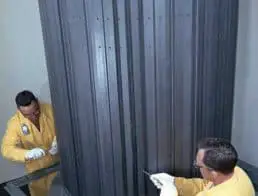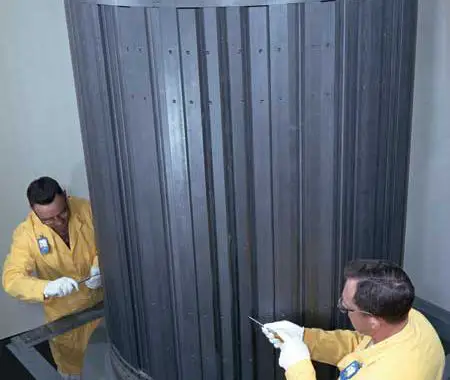For a systems engineer to be employed in operation and supervision of nuclear plants, one must complete a four
year degree course in nuclear engineering in acollege that is accredited by ABET. For research, regulatory and other
related fields a masters or a doctorate will be the norm. The pay begins at six figures (which is roughly a third higher
than other engineers and three times that of the median income in this country). While it is good if you are licensed,
it is not a hard requirement. However internship and the experience from it is a valuable asset.
This is a serious and responsible career and candidates for this profession will come under a lot of scrutiny. A series
of psychological examinations, thorough background check and drug tests are all standard before you are hired. And
when you are at work you are also monitored for your behavior – to be on the safe side.
Safey Considations
This question is legitimate and is best answered by science and not by scare mongering. Like with all news, the bad
ones gets all the publicity while the vast majority of good ones go unnoticed. That is so in the operationof nuclear
facilities too. Also it is a constant learning and improvement process – with computer simulation at the heart of it –
and the safety standards are very high indeed. As an operator you need not fear that you would be lethally irradiated
– don’t take anyone’s word for it, the dosimeter around your neck all the time you work ( mandatory) will attest to
that.
Job Outlook
Nuclear energy, for good or bad, is here to stay. For one thing, what is learned cannot be unlearned! Our nuclear
powered Navy is the prime employer of freshly minted nuclear engineers. On the civilian side though at present
there appears to be a hiatus in nuclear power plant construction, research related to it and even weapon related, there
are other areas where a steady growth is seen. This is especially true in the field of Nuclear medicine and Medical
physics. Also, not to forget, there is this vital area of decommissioning plants and weapons (as per treaties etc) and
the corollary of nuclear waste disposal. This field is growing in importance and will have limitless potential when
the other dormant areas mentioned above pick up. Lastly, there is a growing demand for nuclear power in other
countries worldwide and the US with its technologies and expertise is poised to be a leader to meet this market.
Overall, the economic forecast through 2020 is for a job growth rate in the nuclear engineering field to be about as
fast as in other ‘regular’ engineering fields.
Typically, for an operating nuclear engineer’s post the educational requirements are not as rigorous as would be
for research and regulatory positions. One with a High school diploma can get the training through the U.S. Navy
Nuclear Power Plant Program. Passing the Professional Engineering Exams, and holding Licenses such as Senior
Reactor Operators license (SRO) are valuable in climbing up the career ladder in the operations field, where
positions such as maintenance supervisor, Project Manger or Training instructor are also available. The Nuclear
Regulatory Commission (NRC) and the Institute of Nuclear Power Operations (INPO) and such federal and private
groups hire nuclear engineers at top dollar.
About the Profession
This is a profession that demands dedication and focus and therefore one must be prepared to work hard. It is better
if you have a diverse area of interest such as waste disposal issues,power generation and even the odd couple –
science and politics.
Learning on the job and keeping your eyes open can open up great avenues of enrichment – as it is with nuclear fuel,
so it can be with you. You can start your own business employing a good number of people, especially in the fields
of waste disposal, supply work, outage services etc.
The future of a nuclear engineering career is good. Lot of old timers are retiring and young blood is needed. Not
only the power utilities but also reactor designers and engineering firms – Areva, Westinghouse,Shaw Group,
Bechtel to name a few – are recruiting. Ancillary nuclear industries such as fuel fabricators, fuel enrichment
complex and steel makers for pipes, chemical producers – all have a stake in nuclear engineering and need people.
And then there are the makers of radio isotopes for medicines and industrial use.
Where Nuclear Engineers Are Needed
Perhaps the one branch that holds the brightest prospects is health physics and the application of nuclear engineering
to it. There are a growing number of scanners and other radiation based health machines that need monitoring,
calibration etc. All the operators that handle radiation based equipment from X-rays to most advanced scanners have
to be trained and their performance evaluated to ensure safe and efficient handling of the equipment. With health
care becoming a significant chunk of the GDP the potential for growth is immense and the nuclear engineers of the
future are theones who will fill the need admirably.
Further Reading
http://www.bls.gov/ooh/architecture-and-engineering/nuclear-engineers.htm#tab-4
http://www.artofmanliness.com/2009/01/07/so-you-want-my-job-nuclear-engineer/
http://education-portal.com/articles/Nuclear_Engineer_Job_Description_and_Requirements_for_a_Career_in_Nuclear_Engineering.html
https://nationalcareersservice.direct.gov.uk/advice/planning/jobprofiles/Pages/nuclearengineer.aspx
https://bigfuture.collegeboard.org/careers/architecture-engineeringand-drafting-nuclear-engineers
http://en.wikipedia.org/wiki/Nuclear_engineering
http://www.ehow.com/how_2074734_become-nuclear-engineer.html
http://www.princetonreview.com/careers.aspx?cid=99
http://www.campusexplorer.com/careers/6868C687/nuclear-engineers/
http://www.sciencebuddies.org/science-fair-projects/science-engineering-careers/Energy_nuclearengineer_c001.shtml








